Columbus State unveils new headquarters, upgraded services for military-connected students
August 30, 2023
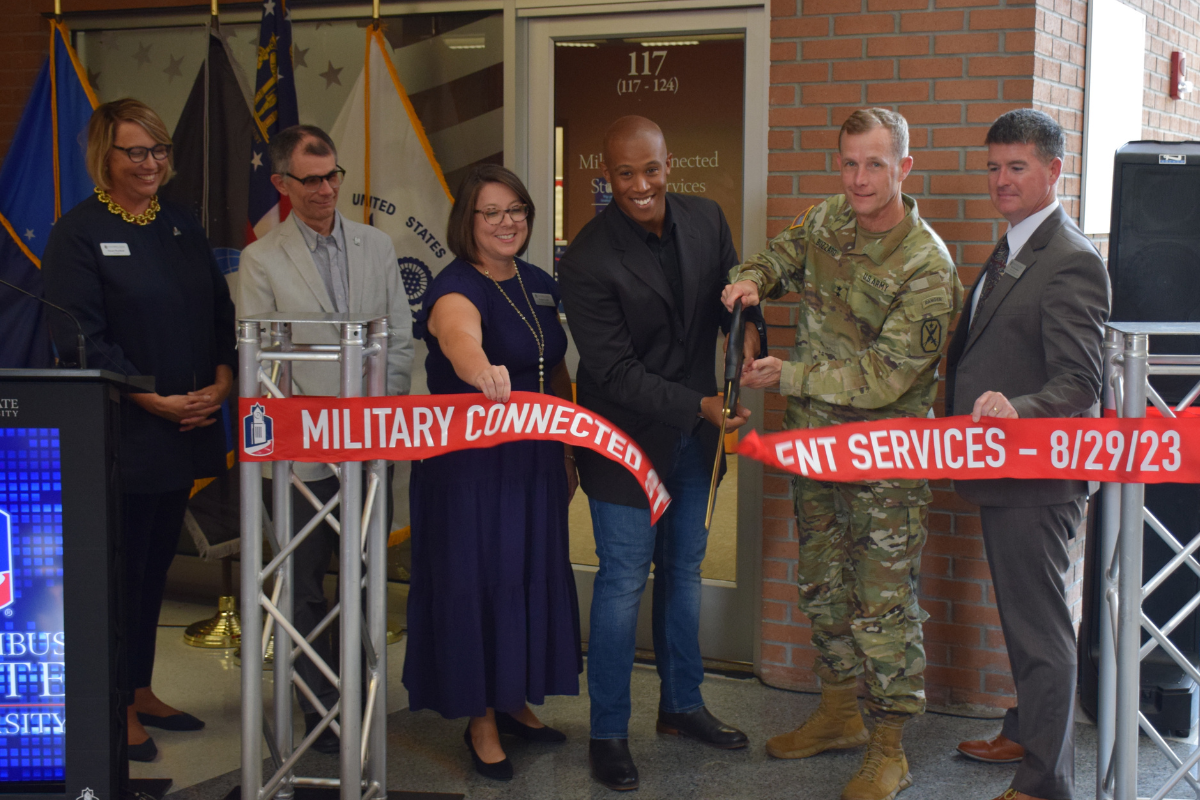
As part of its ongoing efforts to enhance services for its current and future military-connected students, Columbus State University has unveiled the new headquarters — and a new name — for its Military-Connected Student Services.
Now located in the university’s Schuster Student Success Center on its Main Campus, the recently relocated office is just part of Columbus State’s programs designed to serve active-duty and transitioning soldiers, veterans and their families. Collectively, those programs recently garnered the university a spot on MilitaryFriendly.com’s top-10 military-friendly schools list.
“Columbus State was founded to serve the needs of our community — and that has always included Fort Moore,” said President Stuart Rayfield at the office’s Aug. 29 ribbon-cutting event. “We're so lucky to have Fort Moore in our backyard. It’s our duty and our responsibility to understand [the military community’s] educational needs and to serve those needs. It's a real honor to be able to be a part of their educational journey.”
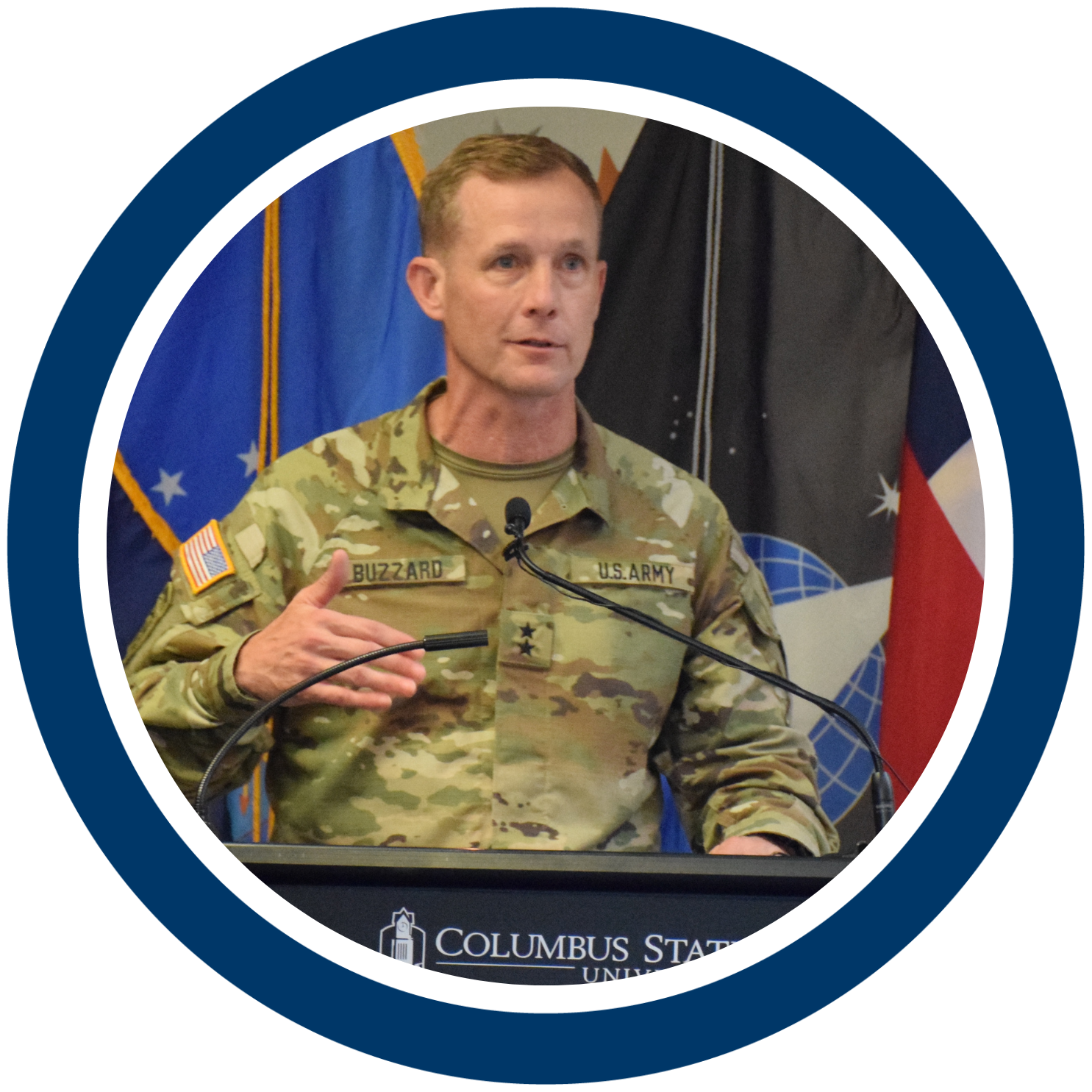
Currently, Columbus State’s student body includes around 1,200 active-duty servicemembers, veterans, spouses and their dependents — nearly 20% of all enrolled students. Columbus State is one of only five resident colleges and universities with an on-post presence at nearby Fort Moore. That relationship is underscored by several academic and research partnerships.
“Columbus State helps our soldiers be more and has been such a steadfast partner with Fort Moore over the years — this is just yet another example of that partnership,” said Maj. Gen. Curtis A. Buzzard (pictured), commanding general of the U.S. Army’s Maneuver Center of Excellence and Fort Moore. “[This office will continue to] benefit not just our soldiers but their families and the many students here who have a military background.”
The office’s advisers and counselors assist military-connected students with resources ranging from school-life-career balance, transitioning from military life to civilian learning, transfer credit for previous academic studies and military service, and best utilizing educational and financial benefits and scholarship opportunities stemming from military service. It also features expanded spaces where military-connected students can socialize, study and establish a sense of community.
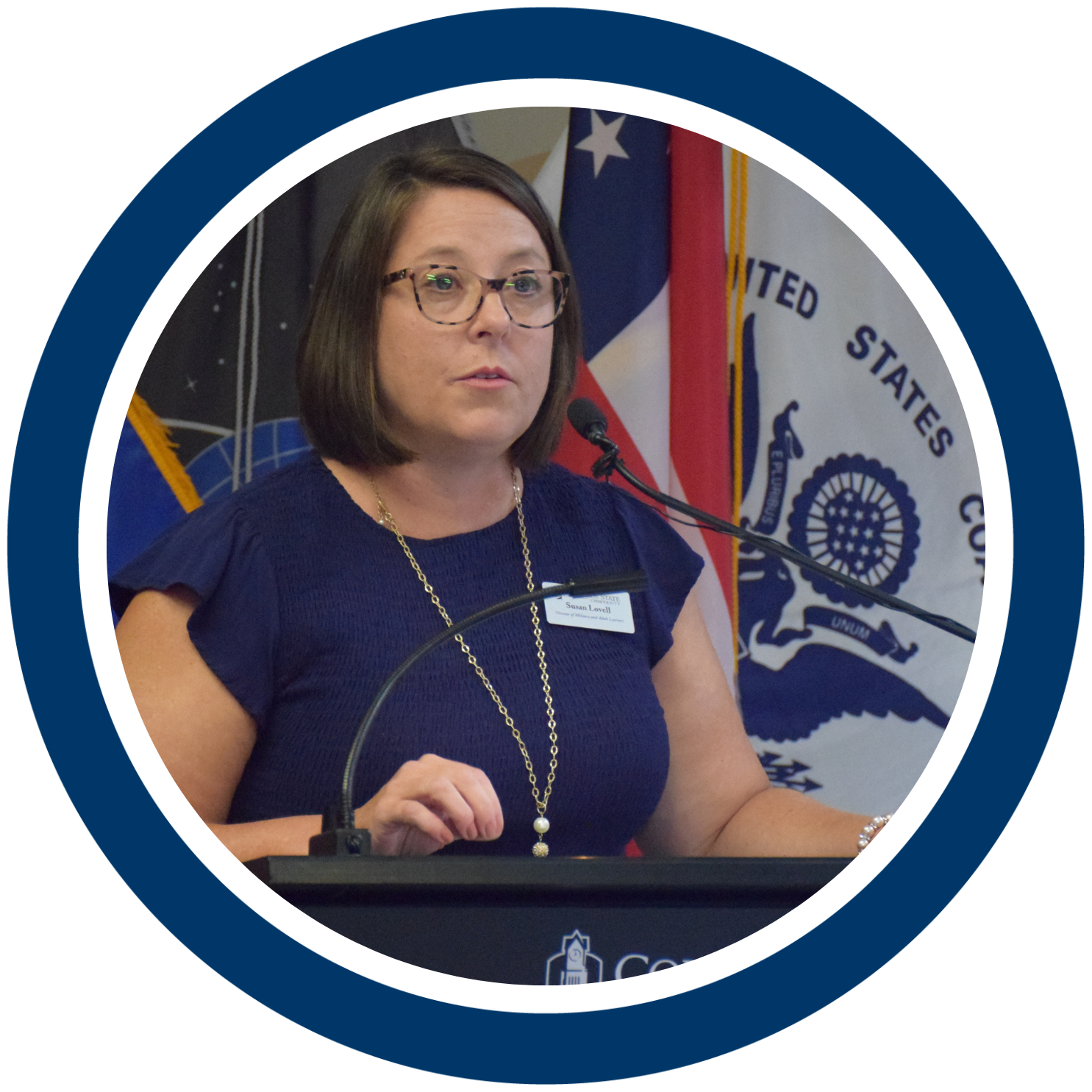 “Our mission is to help students in the best way that we can to help them reach their
goals of achieving educational goals,” explained Susan Lovell (pictured), director
of CSU’s Military-Connected Student Services program. “Their unique life experiences
enrich our classroom discussions. They diversify our campus community and make us
better.”
“Our mission is to help students in the best way that we can to help them reach their
goals of achieving educational goals,” explained Susan Lovell (pictured), director
of CSU’s Military-Connected Student Services program. “Their unique life experiences
enrich our classroom discussions. They diversify our campus community and make us
better.”
Lovell said Columbus State’s growing support of the military community’s educational needs and navigating the intricacies of both college enrollment and military benefits.
“When trying to begin or complete a college degree becomes too complicated for soldiers, veterans and their families, we’re here to navigate and negotiate those challenges,” Lovell explained. “We understand those can be unique to a given student’s situation and goals, as well as the changing nature of active-duty service. When our military-connected students run into those challenges, our team is here to mobilize in a way that ensures success.”
Lovell said that sense of community is augmented by programs that include the Student Veterans Association, Veteran Peer Mentoring Program, and the university’s Green Zone training for faculty and staff that helps foster a supportive environment for the university’s military-connected learners.
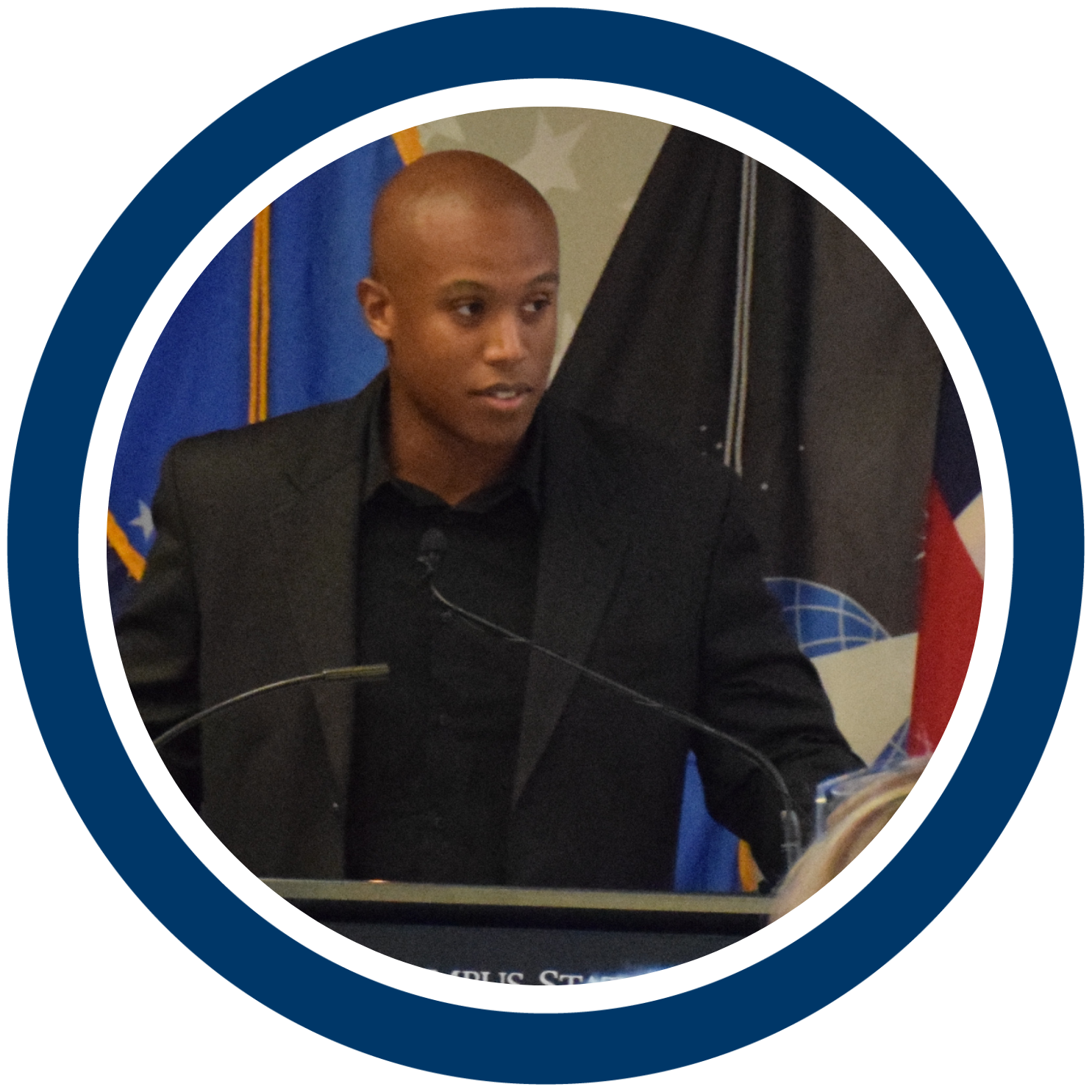 “As I’ve connected with more folks who are in the process of leaving the military,
it's become clear that there's a gap in their readiness for civilian and college life,”
said Agnelo Lopes (pictured), who in addition to pursuing a master of public administration
degree, is a CSU ROTC cadet, president of the CSU Student Veterans Association, a veteran and a father.
“This really drives home the significance of this office and why this office means
so much. It is a village, a living testament to the principles that guide our team
in ensuring those who have selflessly served our country find a welcoming environment
to pursue their academic dreams and seamless transition into civilian life.”
“As I’ve connected with more folks who are in the process of leaving the military,
it's become clear that there's a gap in their readiness for civilian and college life,”
said Agnelo Lopes (pictured), who in addition to pursuing a master of public administration
degree, is a CSU ROTC cadet, president of the CSU Student Veterans Association, a veteran and a father.
“This really drives home the significance of this office and why this office means
so much. It is a village, a living testament to the principles that guide our team
in ensuring those who have selflessly served our country find a welcoming environment
to pursue their academic dreams and seamless transition into civilian life.”
Lovell also credited the office’s Military Affiliated Student Advisory Committee, or MASAC, with working lockstep with her team to serve the university’s military-affiliated students.
“MASAC’s job is to support our military-connected students, find out what their needs are, and help them transition from their military service to the classroom and student activities — then to transition again to well-meaning jobs,” explained MASAC co-chair and Vietnam veteran Bill Huff. “Simply put, it’s supporting military students from boots to books to jobs and the boardroom.”
Making degree programs more ‘military-friendly’
In addition to the brick-and-mortar updates, the university has made changes to many of its military-focused degree programs and the cost of earning those degrees. This has included realigning its master of science in organization leadership from 36 hours to 30 hours for active-duty captains completing the Maneuver Captains Career Course. Fort Moore’s MCCC graduates earn nine credit hours toward the organizational leadership-leader development master’s degree, which can now be completed online or on campus. MCCC graduates also earn credit toward a master of public administration degree.
 “Our captains participating in the Maneuver Captains Career Course now better understand
the opportunity they have to be halfway to a master’s degree when they’re done with
the course and head back to their primary duty assignment,” explained Pat Donahoe
(pictured), a recently retired Maneuver Center of Excellence commanding general who
now serves as a special assistant to CSU’s president on military-related matters.
“And now, with online delivery, there's no excuse for a captain who comes through
Fort Moore and completes MCCC training not to get his or her master’s degree.”
“Our captains participating in the Maneuver Captains Career Course now better understand
the opportunity they have to be halfway to a master’s degree when they’re done with
the course and head back to their primary duty assignment,” explained Pat Donahoe
(pictured), a recently retired Maneuver Center of Excellence commanding general who
now serves as a special assistant to CSU’s president on military-related matters.
“And now, with online delivery, there's no excuse for a captain who comes through
Fort Moore and completes MCCC training not to get his or her master’s degree.”
Rayfield highlighted during the ribbon-cutting ceremony that the university has enhanced
its outreach to Fort Moore to include in-person classes on post. The first of those
this semester will include a three-Saturday series taught by the Turner College of Business & Technology’s dean, Dr. Deborah Kidder, that will provide MCCC participants with credit toward their master of science degree
in organizational leadership.
Donahoe also explained that Columbus State’s undergraduate interdisciplinary degree is growing in popularity among non-commissioned officers and other military-connected
students. It is especially ideal for military students whose frequently changing duty
assignments have made completing a bachelor’s degree at one college or university
challenging or impossible.
“Think about the NCO who has changed duty stations 17 different times in their career and, as a result, has college credit from 14 different universities,” he said. “For our military-connected students, our bachelor’s in interdisciplinary studies will help us cobble all of that together to the point that they can finally finish their degree with just a few more courses — instead of starting completely from scratch like they may have done in the past.”
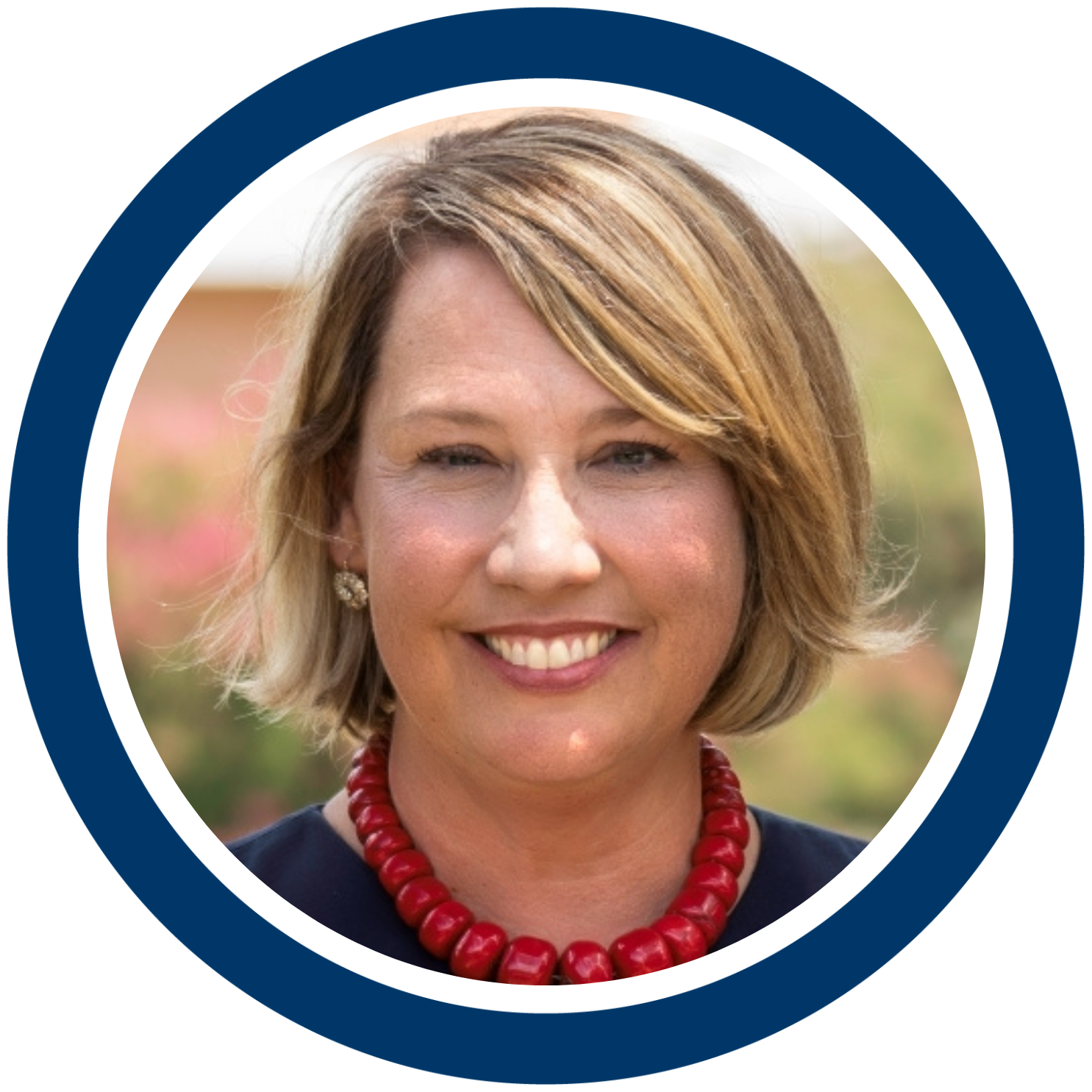 “Many of our military-connected students will start here [at Columbus State] and then
transition to another installation — and they're not sure what they're going to do
about continuing their studies,” Rayfield (pictured) observed. “It used to be the
case that we couldn’t serve them once they left. But with online learning and virtual
education, we're able to serve them from the time they walk in [our Military-Connected
Student Services office] to the time they graduate — no matter where they are in the
world.”
“Many of our military-connected students will start here [at Columbus State] and then
transition to another installation — and they're not sure what they're going to do
about continuing their studies,” Rayfield (pictured) observed. “It used to be the
case that we couldn’t serve them once they left. But with online learning and virtual
education, we're able to serve them from the time they walk in [our Military-Connected
Student Services office] to the time they graduate — no matter where they are in the
world.”
Making studies at Columbus State more military-friendly also includes eliminating all mandated student fees (except for on-campus parking) for military-connected students funding their education through the Military Tuition Assistance Program so the cost of their education does not exceed benefit program caps.
For more information about Columbus State’s military-connected programs and services, visit the Military-Connected Student Services website.
Media contact:
Michael Tullier, APR, Executive Director of Strategic Communication + Marketing, 706.507.8729,
mtullier@columbusstate.edu
You might also be interested in:
Columbus State ranked 8th nationally as military-friendly school for its size (March 26, 2023)
Military-focused degrees, support programs foster military-friendly experience for
CSU students (April 3, 2023)
Related media coverage:
Fort Moore and CSU enhance Military-Connected Student Services (Aug. 29, 2023, WRBL-TV)
MILITARY MATTERS: Columbus State Opens New HQ For Military-Connected Students, With
Help From Fort Moore (Sept. 12, 2023, WTVM-TV)